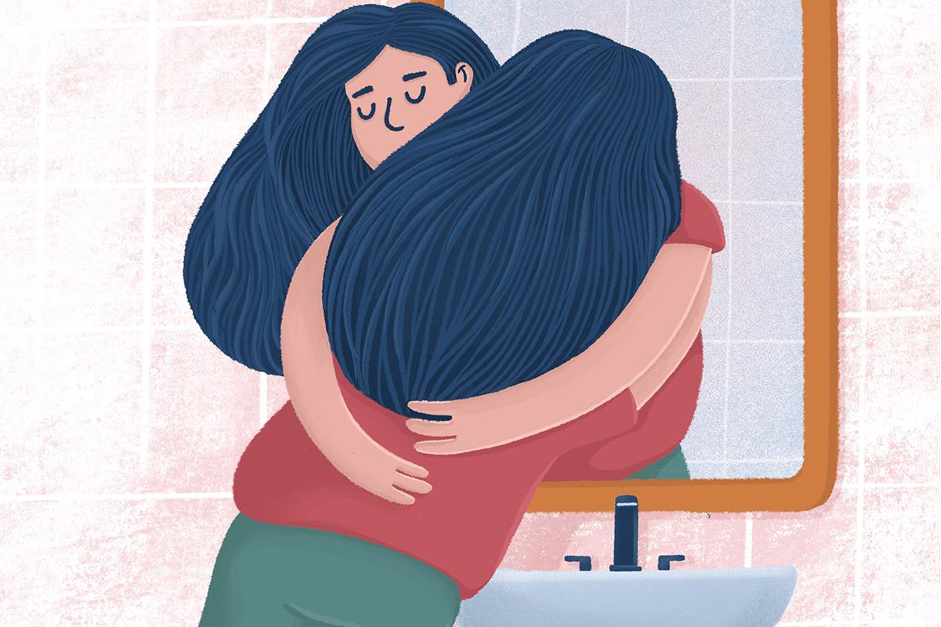What comes to mind for you when you consider being more self-compassionate? If you’re like most people, you have mixed feelings about it. On the one hand, you want to treat yourself a bit better, a little less name-calling or mean-spiritedness, but on the other hand, you may wonder if you deserve it or worry you will let too many things go if you’re too nice to yourself.
In this blog, I’ll discuss some of the common reservations as well as look at the three elements of self-compassion. The first component involves awareness and acceptance of moments when we are suffering. I sometimes find this step challenging in the sense that by accepting that I am suffering, there is almost an admitting of defeat. Yet, when I can accept my suffering, I feel a sense of relief and hopefulness. It’s important to note, however, that mindful awareness of suffering is not the same as self-pity, which includes awareness of suffering but adds an exaggeration of it and mixes in a good dose of helplessness and attention seeking. Mindful awareness is simply focusing on being accurate in the moment of what is happening with an as little added story as possible. Our focus can go into noticing individual body sensations (e.g., my stomach feels tied up in knots), general feelings (e.g., anxiety), and the thoughts/stories we are experiencing (e.g., “I can’t believe I said that. What an idiot.”).
The second pillar of self-compassion reduces the trend toward self-pity by integrating an awareness of how our suffering is part of the human condition. By bringing attention to the universality of human suffering, we feel a little less alone in our suffering, and a little less entitled to self-absorption. It might be helpful to develop a mantra (e.g., “It’s only human to suffer.”). This step invites a feeling of being united with others on this earth. Spend a moment reflecting that everyone suffers, some more and some less. In my practice, I encounter some complaints about this pillar, it minimizes how much suffering is being experienced. For example, someone losing their child to cancer might react by placing their suffering alongside the suffering of their neighbor whose children are all healthy. If that’s the case, consider mantras that emphasize that suffering is often imbalanced (e.g., “We all suffer, and now, my suffering is extreme.”). You must experience self-validation alongside the recognition of the universality of human suffering.
The last pillar is to consciously choose to be kind toward yourself. This step is not to be confused with self-indulgence which prioritizes how we feel right now at the expense of how we will feel in the future. For example, it is generally not an act of kindness to give in to immediate gratification such as Netflix binging (although sometimes that might be true what we need), even though it might feel better than something more difficult like going for a walk. As well, self-compassion is often confused with making excuses and lacking accountability. However, the more clearly we can experience our suffering and do so in a way that accepts responsibility without harsh self-treatment, the more likely we are to own our part in negative outcomes.
Once you’ve chosen to be kind to yourself and recognize what that means, the next step involves identifying the needs attached to your feelings and thoughts. Ask yourself what needs and yearnings might be beneath the suffering (e.g., feelings of fatigue and overwhelm leading to the desire for a Netflix binge might be related to a need for rest and peace). Once you’ve identified the needs then come up with something that will help fill that need, even if it’s only a very small amount. In the Netflix example, your need for rest and peace might be much better served by resting your eyes in a quiet environment or a hot bath.
Here are some further examples of meeting needs:
1. If your need is related to soothing negative self-talk, talk to yourself as you imagine a great friend/family member would treat you. If you don’t have someone who comes to mind, imagine how someone or some being who deeply cares about you might treat you.
2. If the need is related to disappointment/shame/embarrassment then perhaps there is learning in the suffering; some actions can be taken now that would reduce rumination (e.g., “I feel horrible that I called my partner lazy” might be somewhat healed by apologizing).
3. You might repeat a self-compassion meditation. For example:
“May I be safe?
May I be peaceful? May I be kind to myself? May I accept myself as I am? May I accept my life as it is?”
4. If someone was unkind toward you, it might feel good to share your pain with someone you trust, to feel their kindness and validation.
5. You might reach out to a person(s) who contributed to the suffering, letting them know about your above process (if you trust them enough for this process), and possibly adding a request for a change from them.
6. You might commit a boundary with someone/others who have historically contributed to your suffering.
7. You might connect with nature/spirituality for healing.
For more information on self-compassion (as well as access to guided meditations and a quick self-assessment to rate your level of self-compassion), go to self-compassion.org. At Synergy Counselling, we are here to help you develop your ability to be more compassionate to yourself.

